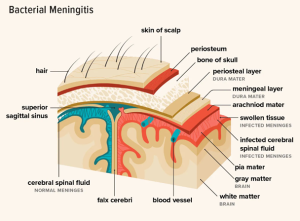Full Text
Meningitis cases have been a yearly occurrence in Nigeria, with a spike observed during the dry season. The disease is highly contagious and can kill a person within 24 hours. Late January 2023, the federal government alerted Nigerians on the rise of cerebrospinal meningitis in Jigawa state, with preliminary reports indicating 117 suspected cases and 12 confirmed cases.
Consequently, the Nigeria Centre for Disease Control (NCDC) deployed a Rapid Response Team (RRT) to Jigawa, Yobe, and Katsina States to combat the disease. However, on February 17, no fewer than 38 persons were reported to have died from suspected meningitis cases in Jigawa. The outbreak in Jigawa is a tragic reminder of the ongoing threat of infectious diseases in the region and the urgent need for improved healthcare infrastructure and disease surveillance systems.
Meningitis and its causes
Meningitis is an inflammation of the meninges, a thin layer of the connective tissue that covers the brain and the spinal cord. Keneth Ayange, a medical officer at Anglican Hospital Kafanchan, noted that it is an infection of the Central Nervous System that leads to inflammation of the brain covering called the meninges.

The most common causes of meningitis are viral and bacterial infections. When caused by an infection, this inflammation can be caused by various organisms, bacteria, viruses, parasites or fungi. Injuries and certain drugs can also cause such inflammation. According to Dr Ayange, some of the factors that make individuals more susceptible to meningitis is the dry season. “The dry season creates a conducive environment for meningitis to thrive, as the dryness of the nose makes it easier for bacteria to settle and be inhaled. Moreover, the fragility of the nasal passage during the dry season can lead to infections, which can be easily transmitted to other parts of the body,” he said.
Another predisposing factor of meningitis is the lack of appropriate vaccination for the specific strain of bacteria causing the disease. Outbreaks of meningitis are not uncommon in some areas of the world, including the African meningitis belt, which includes Nigeria. Dr Ayange noted that this belt covers the 19 states in the north, including Jigawa. “The occurrence of meningitis is high in this zone. The Neisseria meningitides type C strain, in particular, has been wreaking havoc in the region,” he said.

Symptoms of Meningitis
Common symptoms of meningitis include a stiff neck, high fever, sensitivity to light, confusion, headaches and vomiting. In infants, symptoms may include high fever, constant crying, the baby seems overly sleepy, sluggish, or inactive, poor feeding, and crankiness. Bacterial or fungal meningitis symptoms may last a few days to a week or more after treatment. It can take weeks to months to recover, and some people have long-lasting or permanent health issues.
Types of Meningitis
Bacterial meningitis
This type of meningitis is contagious and caused by infection from certain bacteria. Bacterial meningitis is of significant public health importance because it has high morbidity and mortality. It can be epidemic prone depending on the type of bacteria, and it is both treatable and preventable.
Viral bacterial
Viral bacteria is the most common type of bacterial and less severe than bacterial meningitis. This type of meningitis typically goes away without treatment. However, some causes do need to be treated.
Fungal meningitis
This is a rare type of meningitis. It is caused by a fungus that infects your body and then spreads from your bloodstream to your brain or spinal cord. People with a weakened immune system are more likely to develop fungal meningitis.
Parasitic meningitis
Various parasites can cause meningitis. Parasites are found in dirt, faeces, and on some animals and food, like snails, raw fish, poultry, or produce. Parasitic meningitis is not passed from person to person. Instead, these parasites infect an animal or hide out on food that a human then eats.
Non-infectious meningitis
Non-infectious meningitis is not an infection. Instead, it is meningitis caused by other medical conditions or treatments. These include a head injury, brain surgery, cancer, lupus and certain medications.
Chronic Meningitis
This type is caused by fungi, rheumatological conditions, and cancer, among others. Treatment for chronic meningitis is directed at treating the cause.
Transmission of Meningitis
According to the World Health Organisation (WHO), the bacteria that cause meningitis are transmitted from person-to-person through droplets of respiratory or throat secretions from carriers. Close and prolonged contact – such as kissing, sneezing, coughing on someone, or living in close quarters with an infected person, also facilitates the spread of the disease.
The average incubation period is four days but can range between two and ten days. The bacteria can be carried in the throat and sometimes overwhelm the body’s defences allowing infection to spread through the bloodstream to the brain.
Muhammad Adamu, a medical doctor in the Ministry of Health, Jigawa State, identified several factors contributing to the spread of meningitis in the region. “Overcrowding, low socioeconomic status of affected communities, and flooding in Jigawa state have all been significant issues. In particular, overcrowding resulting from people seeking shelter in temporary accommodations during floods has been a major concern,” he said.
Prevention of Meningitis
The public’s awareness of the spread of meningitis is crucial in combating the disease, as it is airborne. Dr Ayange stressed the need for public education and enlightenment, citing the successful measures taken during the peak of the COVID-19 pandemic. The doctor urged the training of more personnel to detect the disease noting the doctor-to-patient ratio in the region is significantly low.
On an individual level, maintaining a healthy lifestyle, including adequate rest, not smoking, avoiding contact with sick people, and regular hand washing is important to spread the disease. Vaccinations can also protect against certain types of meningitis.
In Jigawa, Dr Muhammad Adamu noted that authorities in the state are on alert for a potential meningitis outbreak this year and have taken measures to prevent the spread of the disease. For instance, the state’s Ministry of Health mobilised resources to search for active cases in communities and treat these cases, even before an outbreak occurs. The government is also providing free treatment to those affected.
Treatment of Meningitis
The treatment of meningitis depends on the type. Bacterial meningitis requires treatment with antibiotics. Viral meningitis can go on its own within about a week. In the case of fungal meningitis, Antifungal medications can be used for treatment.
Conclusion
While vaccination campaigns may be largely successful in controlling the outbreak of meningitis, more work is needed to ensure that Nigerians have adequate access to the resources they need to respond to outbreaks of infectious diseases. The fight against meningitis requires a comprehensive approach that involves a range of stakeholders, from the government to the public, in tackling the disease’s root causes and effects.
The researcher produced this explainer per the DUBAWA 2023 Kwame KariKari Fellowship partnership with BONews to facilitate the ethos of “truth” in journalism and enhance media literacy in the country.

